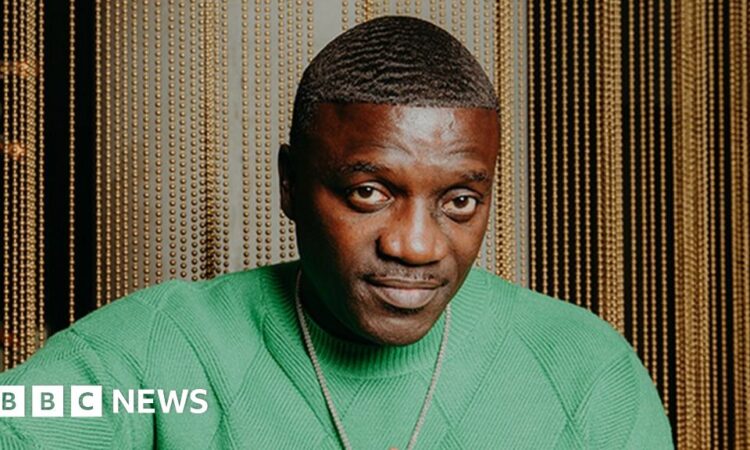
- By Manish Pandey
- BBC Newsbeat
Image source, Konvict Kulture
Akon says there was resistance to his promotion of Afrobeats earlier in his career
RnB star Akon has been in the music business for almost 20 years. And the Senagalese-American singer says he’s finally able to start making music for himself.
Born in the USA, Akon spent his childhood moving between New Jersey and the African country.
He learned to play several western and African instruments, but when he started to pursue a musical career in the early 2000s, he says producers were only interested in one side of his heritage.
“One of the biggest things that I had to actually distance myself from at the time when I did come out, was the fact that I was African,” he tells BBC Newsbeat.
“That wasn’t really something that they could market or promote in that kind of arena that I was actually playing in.”
Commercially, Akon was a massive success, finding huge popularity with pop and RnB songs such as Lonely and Locked Up.
But he says the financial demands of the music business, and the need to make money, had an effect on his output.
“Everything had to be so calculated,” he says. “It becomes stressful and starts to feel like work.”
Since those early successes the Smack That star has developed his own record label, and launched business ventures such as the Konvict Clothing line.
Some of his projects – like building a “real-life Wakanda” in Senegal with its own cryptocurrency – haven’t panned out as planned.
But he says enough have worked out to get him to a position where he no longer relies on others to back him.
Image source, Getty Images
Afrobeats stars Wizkid and Burna Boy, from Nigeria, both took home Grammys in 2021
Making music at 50 years old is more about “the passion and love for music”, he says, and he’s able to include “more of an African influence” in his work because there is less pressure on him to make money.
“Music is not my first revenue stream now, it has dropped down to maybe the tenth,” he says.
He says the financial freedom means he can “add more culture” to his songs, and says the tracks on his new Afro Freaks EP are a “huge evolution” from Lonely and Locked Up.
“I can enjoy doing it without dealing with politics, and the music business that comes with it,” he says.
Akon’s new EP draws heavily from Afrobeats – a genre that’s become a global phenomenon thanks to artists like Davido, Wizkid and Burna Boy.
He says he’s been trying to boost the style of music, which mixes African and Western influences, for years, and even signed Wizkid to his own label in 2008.
But Akon recalls a time when Afrobeats would be dismissed by US industry bosses.
“I remember back in the early 2000s, when I was trying to market and get Afrobeats in America signed, they thought it was Reggae music,” he says.
“It was one of the things that was so frustrating, trying to get them to understand the African population was so big, and this music will be the future.
“Unfortunately, I got a lot of pushback.”
It would be another 10 years before Afrobeats fully broke through, with huge artists like Drake and Beyonce collaborating with some of its biggest stars.
And when Wizkid took home a Grammy Award in 2021, Akon says it was “one of those ‘I told you’ so moments”.
Image source, Konvict Kulture
Akon feels it’s important to have eye-catching visuals which match Afrobeats songs
He puts the rise of Afrobeats down to the younger generation “being more inquisitive about the new music surrounding them”.
“And I think social media had a huge role to play in expanding the sound of different genres, because we didn’t really have any platforms,” he says.
European success of acts like Davido “changed the dynamics” for Afrobeats artists, Akon says, and meant there was a better understanding of helping them to navigate western markets.
He says that huge support from fellow Africans helped to “put the word out”, leading social media platforms “grabbing all of those posts” and “exposing Afrobeats” in a certain light.
Akon says: “Everybody’s really doing their part, to try to get the world to see what that was. And then once they saw it became very infectious, you know?
“That’s what changed everything.”
Akon: ‘I would do a world tour’ to pay back crypto investors
And he thinks the future of the genre is bright.
“Afrobeats is going to be around a long time, because it’s been around a long time [already],” he says.
“The role that I really played was just kind of helping to expose it, putting it out there, and using every opportunity that I had, and every relationship that I had, every resource that I had, to introduced it and hope that people will gravitate.”
And Akon believes that it will drive curiosity about his home continent, and new artists won’t have to distance themselves from their roots like he did.
“It’s shined the light globally, and will now open up the door for people to learn a lot about Africa, through the music of Afrobeats,” he says.






